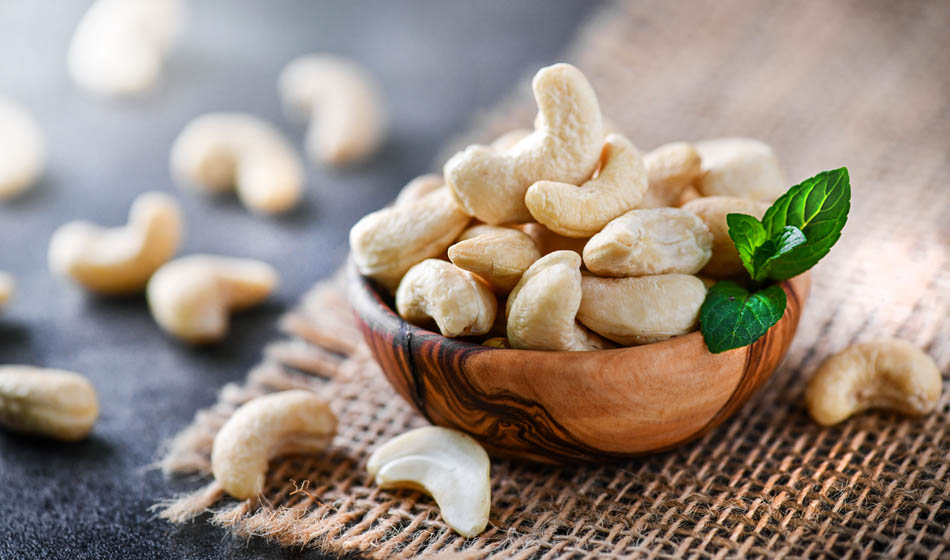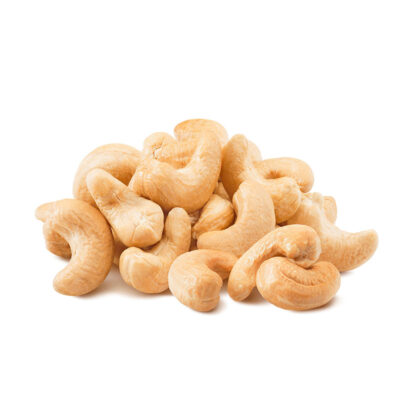Is Cashew Good for Diabetes? The 3 Benefits to Know About
Cashews are popular nuts that are rich in protein, fiber, and healthy fats. Does this mean they’re good for diabetes management? We explain whether this food raises blood sugar and provides the nutritional value, glycemic index, and benefits of eating cashew nuts.

Cashew nuts are a rich source of vitamins, minerals, and heart-friendly fats.
They’re one of the best nuts to have when losing weight or maintaining your health. This is because they support bone, heart, and overall gut health. People can eat cashews raw or roast them for a perfect snack, making this food a perfect addition to your balanced diet.
Of course, you might wonder if cashews can help people with diabetes. There are other nuts in the grocery store, like honey-roasted peanuts, that may raise blood sugar levels. Is this the same for cashews, and how can they improve your long-term health?
In this article, you’ll discover if cashews are good for diabetes, including 3 amazing benefits.
Is Cashew Good for Diabetes?
Yes, cashews are a great option for your diabetes diet. They contain beneficial fats, including monounsaturated and polyunsaturated fat, that increase HDL cholesterol levels. This is the good kind of cholesterol that reduces the risk of heart disease.
Being on a cashew-enriched diet is great for managing blood sugar levels. Cashews contain magnesium, phosphorus, and manganese – important minerals that reduce diabetes-related symptoms. Magnesium is especially great at regulating blood glucose control in the body.
Phosphorus, an essential mineral, may decrease your insulin levels within 60 minutes of consuming a meal. Less insulin means fewer risk factors associated with metabolic syndrome. You can find this active mineral in other nuts, like almonds, which are also great for diabetes.
Research has shown that eating tree nuts five times a week can lower the risk of cardiovascular disease, making it great for your heart health. Eating more nuts, in general, will reduce inflammation in those with diabetes, so it’s worth having more cashews in your diet.
Cashews Nutritional Value
There are plenty of nutrients in cashew nuts that can benefit your long-term health. They contain good fats and dietary fiber – two important ingredients for preventing heart diseases. You should check the label of each cashew product you buy to determine your cashew nut consumption.
Below, you’ll find the nutritional value of cashews per 100 grams:

Glycemic Index of Cashews
The glycemic index of cashew nuts is 25. This low score means cashews won’t raise your blood sugars and cause diabetes symptoms. You can enjoy this type of nut as part of a healthy diet when trying to lose weight or prevent high blood glucose levels.
Foods that are below 55 on the glycemic index scale are perfectly safe to eat. They can’t increase your insulin, cholesterol, or blood pressure levels. For example, white bread has a score of between 80–100, meaning it will increase the sugar content in your bloodstream.
You can eat a handful of cashew nuts every day to stay healthy. They won’t cause blood pressure spikes or hyperglycemia side effects. Other suitable nuts to have include pecans and pistachios, which are good for managing diabetes and maintaining good cholesterol.
Do Cashews Lower Blood Sugar?
Yes, cashews can lower blood sugar levels due to the low glycemic index. This can prevent blood glucose spikes that trigger symptoms like fatigue and headaches. You should snack on these cashew nuts throughout the day to maintain your health.
Cashews are much lower in saturated fats than other nuts. Around 75% of the fat in cashew nuts is oleic acid – a mono-unsaturated omega-3 acid that can prevent cardiovascular diseases. People tend to have misconceptions that fats can change your body weight over time.
Because of these important fatty acids, your blood sugar will stay in a healthy range. To maintain that balance, do regular exercise and only eat clean foods with unsaturated fats. A long-distance run, paired with a cashew snack, could really strengthen your long-term health.
3 Health Benefits of Cashews for Diabetes
Cashew nuts have many health benefits that can make you feel great in the long term. Of course, some types of nuts have a bad reputation due to added sugar and saturated fat. Just remember that consuming cashew nuts daily is perfectly fine for people with diabetes.
Here are the 3 health benefits of eating cashew nuts:
#1 Prevents gallstones
People can get gallstones if their cholesterol levels are too high.
Since cashew nuts contain monounsaturated fat, eating them will reduce low-density lipoprotein (LDL) cholesterol, reducing the risk of gallstone disease. Your liver turns fatty acids into ketone bodies instead of triglycerides, which contribute to the formation of hardened fluid deposits.
#2 Helps to manage weight
Cashew nuts may be great for weight loss, as they hold lots of important nutrients.
Magnesium can support weight loss by strengthening your metabolism. Of course, a fast metabolism means the body burns extra calories throughout the day and naturally reduces your weight. This mineral also improves lipid profiles by limiting the production of stubborn fat cells.
There are also 15.3 grams of protein in cashew nuts, which can promote satiety. People who feel full after meals are less likely to snack or binge eat. If you want to reduce your body weight even more, get your 10,000 steps in a day or follow a healthy diet that focuses on very clean foods.
Just be aware that in 100 grams of cashew nuts, there are 574 calories. Eating too much could lead to weight gain if you’re not monitoring your calorie intake.
#3 Great for heart health
Cashews can be really great for strengthening the heart. This is because they contain potassium – an important mineral that lowers high blood pressure, cholesterol levels, and blood fat content. Eating these nuts may prevent heart disease in older adults with type 2 diabetes.
The oleic acid in cashew nuts can also reduce the risk of coronary artery disease. Common fatty acids help regulate blood pressure and keep your blood glucose level low. It’s worth eating these cashew nuts as part of your healthy diet to avoid heart complications in the future.
FAQs
Yes, cashews have around 5.01 grams of sugar per 100 grams. However, these are natural sugars that won’t harm your health or ruin long-term diabetes management. Snacking on these nuts in moderate amounts throughout the day will keep your blood sugar levels low.
No, you can’t reverse diabetes, but cashew nuts may help you manage it. They contain heart-healthy monounsaturated fat that reduces blood sugars and promotes good cholesterol. Cashew nuts protect your heart and reduce any serious complications of type 2 diabetes.
You can eat around 10 cashews daily to support your health. This is enough to lower blood glucose levels and any risk factors of heart disease. Consuming 10 of these nuts should be equivalent to 6.96 grams of healthy fats, which is great for reducing diabetes symptoms.
A Word From Our MD
Cashew nuts or cashew nut extract is the best nut to have for diabetes management. Not only do they reduce high blood pressure, but they can also prevent chronic diseases. Along with these benefits, people may have a reduced body weight when snacking on them during the day.
Just remember that these nuts only have good fats. They can’t cause weight gain or disrupt any fat loss progress. However, always read the label before buying each product. This ensures you don’t buy salted nuts or honey-roasted flavors that could trigger insulin production.
You can consult with your doctor about managing diabetes symptoms or find a registered dietitian that may guide you through healthy recipes.
Conclusion
So, are cashews really good for diabetes?
Cashews should definitely be a part of your diet. They contain healthy nutrients that reduce blood pressure and blood sugars. Some people eat nuts raw or combine them with diabetes-friendly meals, so it entirely depends on how you want to enjoy eating cashew nuts.

















































 Select your language:
Select your language: 








